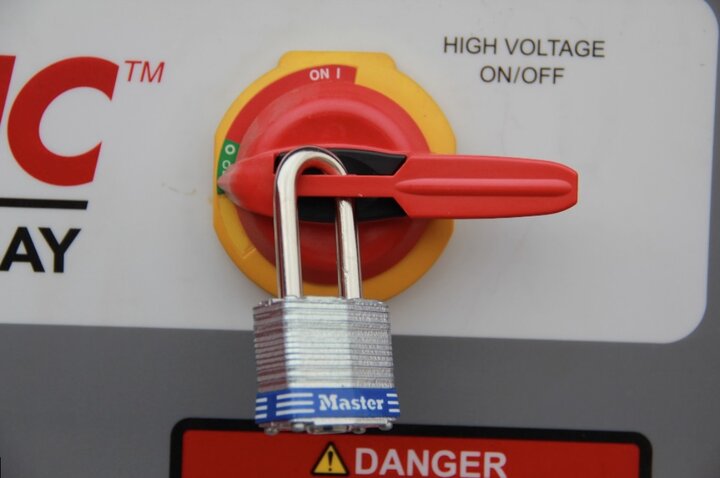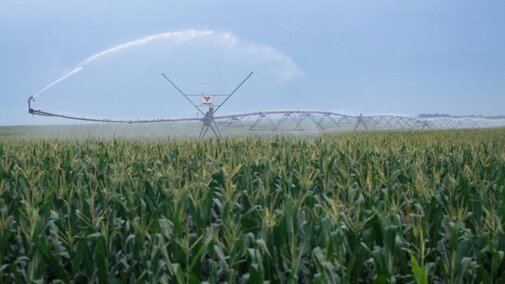Center pivots have revolutionized irrigation, greatly increasing water application efficiency and have become a way of life on many irrigated farms.
Pivots, like every machine on the farm, have several potential hazards, making it important to review safety procedures each year with every person on the farm. Every person that will operate the system should read all the safety instructions in the machine’s manual or be trained by a knowledgeable trainer. This article is not intended to be a comprehensive list of safety precautions; always read and understand the safety instructions in your specific irrigation system’s manual and refer to the safety stickers on the equipment when in the field.
The majority of the pivot systems are powered at some level by electricity. The industry has done an excellent job of producing safe equipment, which are by in large correctly installed by qualified dealers and electricians. However, because 480 V power is being used, safety must always be a top priority because it can kill you.
Other hazards like falling or becoming entangled in drive shafts must be taken seriously as well.
Electrical Safety
The most important electrical safety rule of thumb is: All equipment will fail. Job one for the manufacturer, installer, operator, and maintenance personnel is to make sure that when it does fail, it fails in a safe manner that will not harm people or animals.
One of the most common, as well as one of the biggest safety hazard with not just irrigation equipment, but all high voltage equipment on the farm, is not having the 4th grounding wire present or correctly connected all the way back to the power grid or generator. Having the grounding rod correctly installed and connected is a requirement, but is not a foolproof personal safety device by itself. Grounding rods can be installed in situations where it is of little good because of soil type or after a lightning strike. Some dealers have meters to check the rod installation for its resistance level if you would like to have it checked out. Checking the integrity of the 4th wire grounding system back to the power grid or generator is a job for your electrician or pivot service technician unless you are competent electrician yourself.
A recommended procedure is to always touch high-voltage equipment first with the back of your hand – because if it is hot and you grab it with your fingers, you may not be able to let go. Also, if you suspect a problem with the equipment, fix it right away by calling your dealer if you are not qualified to do the work yourself. Never slug or put a jumper wire around fuses to get the equipment running with the idea you will fix it later. Slugged fuses will kill people. A slight electrical tingle today may indicate a problem that can kill you under different environmental conditions tomorrow. The short term gains of getting the system running a day or two sooner is not worth the risk of someone being killed.

If the system is powered in any way with electricity, always turn the disconnect switch to the off position and follow Lock Out/Tag Out procedures described in the operators manual before doing any work on it. An example of part of the Lock Out/Tag Out procedures may be placing a padlock on the disconnect switch to prevent someone else from turning it back on and starting the system (Figure 1). Pivots are a long machine, and it is difficult for people to see if someone is working on it. In addition, with remote start systems today, it is more important than ever – even if you are just fixing a flat tire, let alone if you are working on the electrical system.
Lock Out/Tag Out procedures are something most farmers never think about. We figure we are working by ourselves and no one is going to turn on the equipment. However, one such case was shown in the feature film “SILO” in several locations across the state this past winter. It tells the story of two men that become entrapped in a grain bin because a third person not knowing the two are in the bin starts loading a truck. If they would have just turned off the power and put a padlock on the disconnect the tragedy could have been prevented. Another good lock out procedure is to always but the ignition key of any motorized vehicle in your pocket before starting to work on it.
Stay away from pivots if lightning is in the area because they are notorious for being struck.
The pivot panel high voltage disconnect switch does not turn off all of the power inside the panel. So if you need to work inside the panel to fix a problem or even just clean out a nest from a mouse that got in the panel through conduit that was not properly installed, make sure to turn the power off to the main disconnect switch or call your dealer if you are unsure how to turn it off. A voltmeter is a handy tool to check to make sure the power is off. The best procedure to use when using a voltmeter is to check the wires with the meter before the electricity is turned off to make sure the meter is working, then turn the power off and recheck to make sure the right switch is turned off.
Other Safety Hazards with Pivots
The biggest non-electrical safety hazard with pivots is missing driveshaft covers. Even though the tower motors are small, the center drive gear reduction results in an incredible amount of torque on the driveshaft. If someone is caught in the driveshaft, they can be seriously injured or killed. It is important to keep all safety equipment including shields in good repair.
Falls are another concern when working on pivots. Never climb on a pivot if it is running or wet. The best method to perform overhead work on a pivot is to use a personal lift device.
If the pivot has been applying pesticides or the field has been treated, follow all safety instructions on the pesticide label regarding reentering the field and personal protective equipment.
Never park or place anything on the pivot tracks. Pivots are an all-wheel drive machine capable of crawling up and over or crash themselves on anything placed in the way.
Pivots are an essential part of many irrigated farms and by following the safety procedures and keeping the system in good repair, they will provide a safe and efficient method of applying irrigation for many years to come. For more information and references go to: go.unl.edu/pivotsafety

